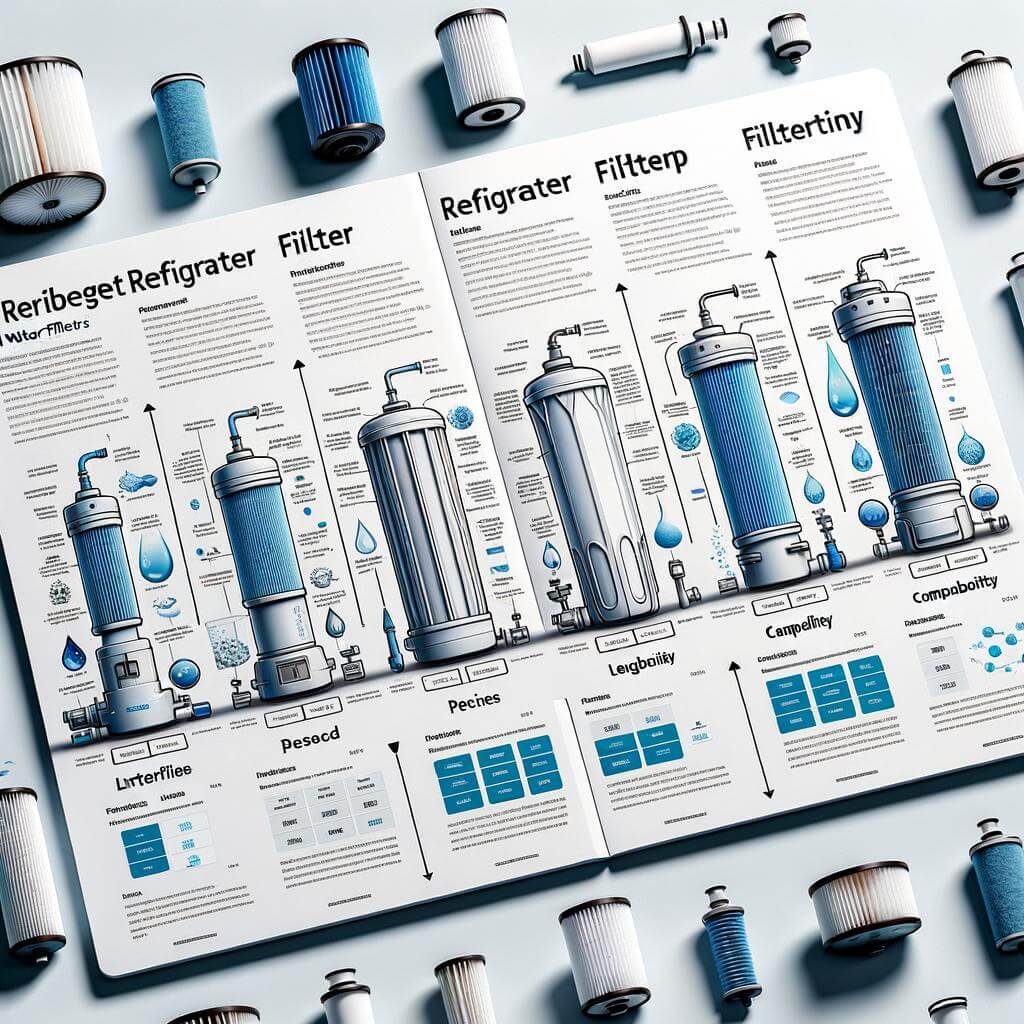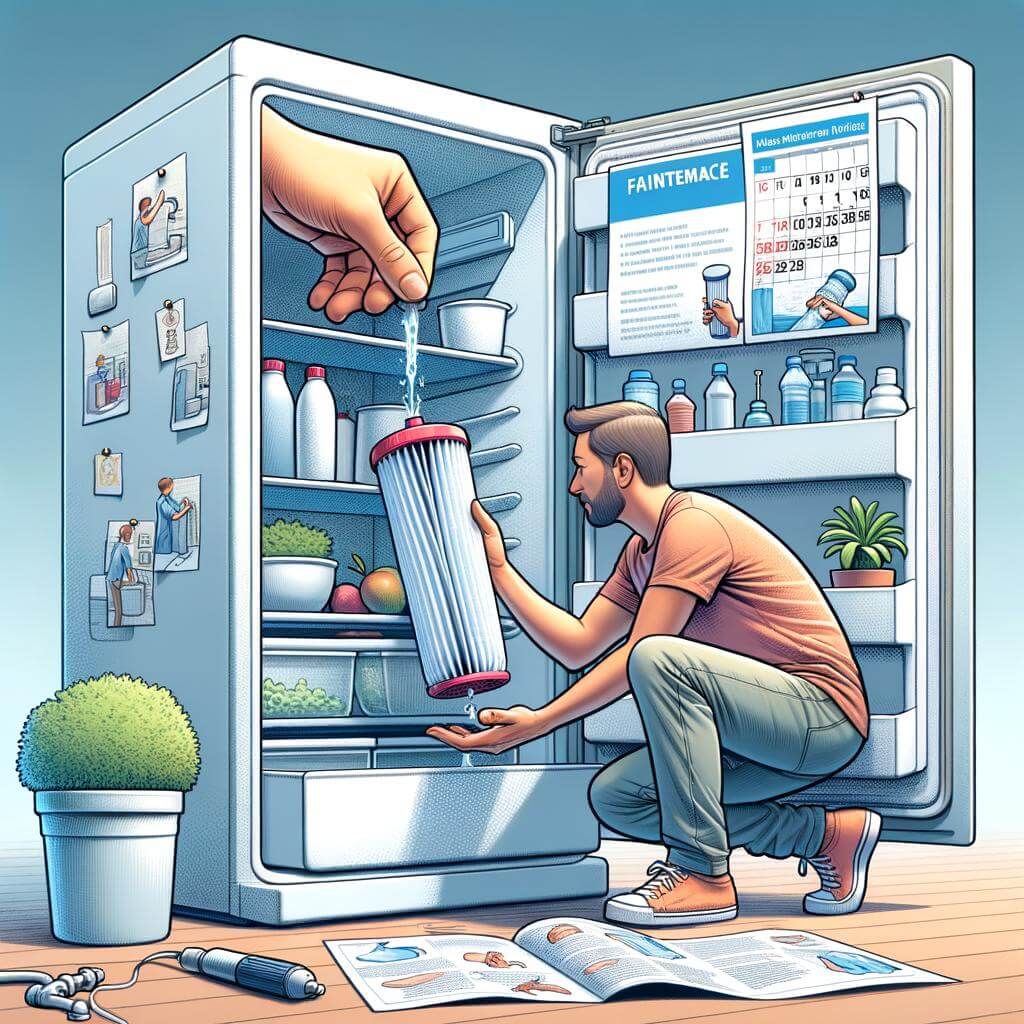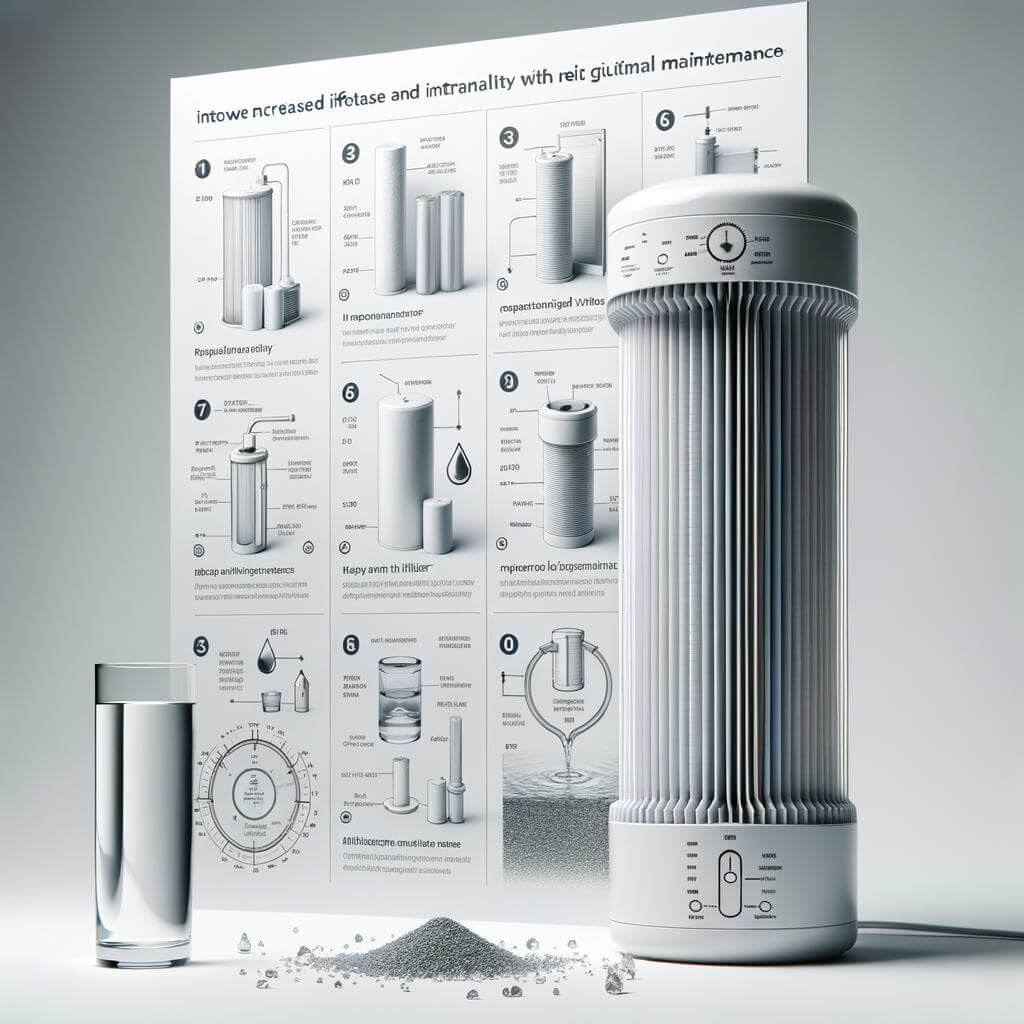Welcome to our latest post – “Steps to Obtain Clean, Refreshing Water for Your Refrigerator”. Providing you with clean and fresh-tasting water is an essential part of any refrigerator’s function. However, this vital task may not always be executed as well as it should be, affecting the quality of your water and your health. This comprehensive guide offers step-by-step, easy-to-follow instructions on how to ensure your refrigerator delivers pure, refreshing water consistently. Drawing on expert advice and fact-based information, this educational and practical post will empower you to maintain the healthiest and tastiest water supply from your appliance. Let’s delve in to ensure the water from your fridge is always clean, fresh and ready for consumption.
Understanding the Importance of Clean, Refreshing Water
Drinkable water is a prime necessity in any household, especially when used for hydration. The waters we consume, particularly those stored in our refrigerators, should be free from any impurities, odours and harmful microbes to guarantee our health and wellbeing. The importance of clean, refreshing water spans beyond quenching our thirst. It impacts every beverage we consume directly or indirectly, including our coffees, teas, and not to mention, the ice cubes we use to cool our drinks during warmer seasons.
Filtering Your Water
Before filling your refrigerator with water, it is crucial you ensure you’re using a filtered water source. Filters can be fitted to your kitchen sink or within fridge units themselves. They work by removing impurities from your tap water, including harmful bacteria and heavy metals. Consider the following points when choosing a water filter:
- Absolute vs. nominal filter rating: Absolute filters block 99.9% of particles of a particular size, while nominal fall in the range of 85-90%.
- Materials and build quality: Filters made from quality materials will last longer and perform better.
- Replacement frequency: Filters need periodic replacement to maintain their efficacy. Find one with a replacement frequency that suits your household consumption.
Sanitising Your Fridge Water Dispenser
Your fridge’s water dispenser is a supermarket for bacteria if not appropriately cleaned. Cleaning should be done ideally every month using a vinegar solution. Here is how you can do it:
- Turn off the water supply and remove the fridge’s water filter.
- Fill the water dispenser with a vinegar solution and let it sit for about 10 minutes.
- Scrub the interior thoroughly and rinse until all the smell of vinegar is gone.
- Replace the filter and restore the water supply.

The Role of Refrigerator Water Filters in Ensuring Purity
If you are dedicated to consuming clean and refreshing water, your refrigerator water filter plays a pivotal role in guaranteeing the purity of the water you drink. These filters are designed to eliminate harmful contaminants that often infect your regular water source, such as lead, chlorine, and sediment. They act as the last line of defense between your water supply and your glass, ensuring only the purest water possible makes its way into your body.
Consider the profound benefits the refrigerator water filters have to offer:
- Better Taste and Odor: By removing the contaminants that give water a foul taste and smell, these filters improve the overall taste and odor of your water.
- Reduced Risk of Health Issues: Since the filters eliminate harmful contaminants, the risk of developing health issues that might arise from consuming contaminated water is significantly reduced.
- Cost-Effectiveness: As refrigerator water filters provide you with clean, safe-to-drink water, they eliminate the need for purchasing bottled water, saving you money in the long term.
When choosing a refrigerator water filter, you should consider factors such as the filter’s life span, its compatibility with your refrigerator model, and its ability to remove a wide range of contaminants. Here’s a simple comparison table of some popular refrigerator water filter models:
Remember, the quality of the water you drink substantially impacts your health. Therefore, ensuring the purity of your drinking water with a reliable refrigerator water filter is a decision that contributes significantly to a safer, healthier lifestyle.

Selecting the Right Water Filter for Your Refrigerator
When it comes to choosing a water filter for your refrigerator, two important aspects must be considered: the type of refrigerator and the quality of your local water. Different refrigerators require diverse filters, and they’re not universally interchangeable. For example, top-mount refrigerators often need different filters than side-by-side models. Knowing the average quality of your local water will help you determine whether you need a standard filter or one with higher filtration capabilities.
Here are a few points to consider:
- Quantity of water consumed: Some filters are better for high-usage households, while others are more suitable for smaller families or individuals.
- Water hardness: If your water has a high level of hardness or mineral content, you may need a filter that can cope with this.
- Quality of the local tap water: If your tap water quality is low, you might want a filter that can remove a wide range of contaminants.
| Filter Type | Suitable for | Ability to Handle |
|---|---|---|
| Carbon activated filter | Urban areas, light use | Chlorine, taste, and odor |
| Reverse osmosis filter | Hard water or well water | Fluoride, salt, bacteria |
| Ultraviolet light filter | Rural areas, large families | Bacteria and other microorganisms |
Choosing the right fit doesn’t have to be hard. Once you know the basics, matching a filter to your refrigerator and water needs is just a matter of doing a little research. Always remember, clean, refreshing water is a key part to a healthy lifestyle.

Guidelines for Installing a New Water Filter in Your Refrigerator
Fresh, crystal clear water is a luxury we often take for granted. Quickly accessible through the refrigerator door, water filters work tirelessly to remove impurities ensuring the water you drink is healthful and refreshing. However, to ensure consistent quality of water and peak performance from your refrigerator, it is crucial to install the water filters correctly and replace them when required. Here, we present you with a comprehensive guide to correctly install a new water filter to your refrigerator and ensure refreshing water always.
Before starting, you need to procure a suitable water filter compatible with your refrigerator model. Once procured, the first step is to locate the old filter. Typically, water filters are located either in the grille at the base of your refrigerator or inside the refrigerator at the top right corner. Once located, simply grab the knob and twist it in a counterclockwise direction to remove the old filter. Upon removing, drain any water, if present, from the old filter into a bowl.
Installing the New Filter:
- Remove the new filter from its packaging: Remove protective caps if present on the filter.
- Align and insert: Align the new filter with the arrow marks given in the filter head and insert it into the device. Make sure it goes completely in.
- Rotate: Once it is in place, rotate the filter clockwise until it snaps into place.
- Water flush: Running water through the new filter helps in removing any leftover in the system created during the process. Pour about 3-4 gallons of water before using.
- Reset: Once done, do not forget to reset your change filter light on the refrigerator.
| Type of Filter | Location | Frequency of Change |
|---|---|---|
| Carbon Filters | Inside the refrigerator or at the base | Every 6 months |
| Inline Filters | Behind the refrigerator | Every 12 months |
| Canister Filters | At the base of the refrigerator | Every 6-12 months |
Adhering to these important but simple installation guide will ensure that you always get a continuous supply of clean, refreshing water from your refrigerator. Happy hydrating!

Effective Maintenance Tips for Your Refrigerator Water Filter
Ensuring the proper maintenance of your refrigerator water filter is crucial for the uninterrupted supply of clean, fresh water. Over time, debris buildup may lead to clogs, while the wear and tear may compromise the filter’s ability to properly purify your water. To enjoy the full benefits of your water filter, follow these proven maintenance tips:
- Regular replacement: Most manufacturers recommend replacing your filter every six months or after every 200 gallons of water filtered.
- Inspect for damage: If water flow is noticeably reduced or the water tastes different, it could be a sign that the filter is damaged and should be replaced immediately.
- Cleaning: Clean the area around the water filter compartment. This can prevent bacteria and other harmful substances from contaminating the water supply.
One common misconception about refrigerator water filters is that once they’re installed, they’re good to go forever. This could not be further from the truth. Even the best water filters have a lifespan, and understanding that lifespan is key to maintaining the quality of your water. Here is a handy guide on how to determine when your filter might need replacing:
| Indicator | Need for Replacement |
|---|---|
| Reduced water flow | Assuming no other issue with your refrigerator, a reduced water flow could be an indication that your water filter is clogged and needs to be replaced. |
| Change in water taste | If your water starts to taste different, this could signify that your filter isn’t working as efficiently as it should be, and may need to be replaced. |
| Six months or 200 gallons | As a general guideline, irrespective of any visible symptoms, it’s best to replace your water filter every six months or after every 200 gallons of water filtered. |

Troubleshooting Common Issues with Refrigerator Water Filters
Incorrect Installation and Placement
One of the commonly overlooked issues when it comes to refrigerator water filters is the process of installation. If the filter is not installed correctly, it can lead to poor performance and even lead to potential leaks. To avoid these problems, make sure the filter is aligned correctly with the slot, push it straight into the assembly and rotate it so that it clicks into place. It’s also important to ensure that the filter isn’t too old or past its lifespan. Most filters should be replaced every 6 months, but this can vary based on usage and water quality.
Addressing Clogged or Frozen Filters
Another common issue that refrigerator owners face is clogged or frozen filters. This can dramatically affect the water’s taste or the ice production. The best way to prevent this is to regularly check and replace your filter. If you find that your filter is clogged, try removing it and rinsing it under cold water. For a frozen filter, allow it to thaw and then reinstall it. Remember, it’s important not to force or rush the process, as this can lead to damage!
Additionally, here’s a table of common symptoms and potential solutions:
| Symptom | Potential Solution |
|---|---|
| Poor water taste | Check and replace the filter if necessary |
| Water leaks | Verify correct installation of the filter |
| Low waterfall or slow ice production | May indicate a clogged filter, check and replace if needed |
Still having troubles? Don’t hesitate to contact your refrigerator’s manufacturer for further assistance. Remember, a well-functioning water filter not only ensures tasty and clean water but also extends the lifespan of your refrigerator.

Maximizing the Lifespan and Efficiency of Your Water Filter
We all love the convenience of cold, purified water straight from the fridge. To ensure that you’re always getting the cleanest and freshest water, it’s important to correctly maintain your water filter. Here are a few tips to help you get the most out of your water filter and expand its lifespan for as long as possible.
Maintenance is Key: Regular maintenance is crucial for the efficiency of the water filter. Make sure to always replace your filter according to the manufacturer’s recommendation, usually every six months, or as soon as you notice a decrease in water flow or an unpleasant taste or odor. Regularly clean the filter housing and dispenser to prevent the buildup of harmful bacteria and mineral deposits. Also, flush the filter by running water through it for a few minutes after every replacement to remove any possible carbon residues from the new filter.
- Quality of filter: The quality and reliability of your chosen filter is also important. Remember that not all filters are created equal. Some might be more effective at blocking out contaminants, while others might be longer-lasting. It’s a good balance to strike.
- Correct installation: Lastly, always make sure your filter is properly installed. Incorrect installation can not only lower the effectiveness of the filter, but it could also cause leaks and water damage in your refrigerator. So, ensure a tight fit and correct alignment while installing.
| Item | Significance |
|---|---|
| Replacement | Ensures optimal water purity by keeping the filter system effective. |
| Cleaning | Prevents buildup of bacteria and mineral deposits. |
| Flushing | Removes any residues from the filter leading to better safe water quality. |
| Quality filter | Leads to longer lifespan and better blocking of contaminants. |
| Proper installation | Prevents leakage and damage while an ineffective filtration. |
By adhering to these practices, you can ensure that you’re getting the cleanest water possible, while also extending the life of your fridge’s water filter. A well-maintained water filter guarantees clean, crystal-clear water for you and your family to enjoy every day.
In Conclusion
In conclusion, there is loads of merit in having clean, refreshing water readily available in your refrigerator. Ensuring the purity of this water isn’t rocket science, but involves taking simple, consistent steps to maintain cleanliness. By following the steps we’ve outlined, not only will you enjoy the benefits of drinking cool, refreshing water, but also, you’ll safeguard your health and that of your loved ones, by preventing the intake of water-borne impurities. Regular checks and replacements of filters, proper cleaning and disinfection protocols are largely about building habits into your routine.
Remember, the quality of your water immensely affects your health and well-being. The quality and purity of the water you consume should never be compromised. We hope you find this guide helpful and beneficial towards a healthier lifestyle. Drink clean, live healthy!




